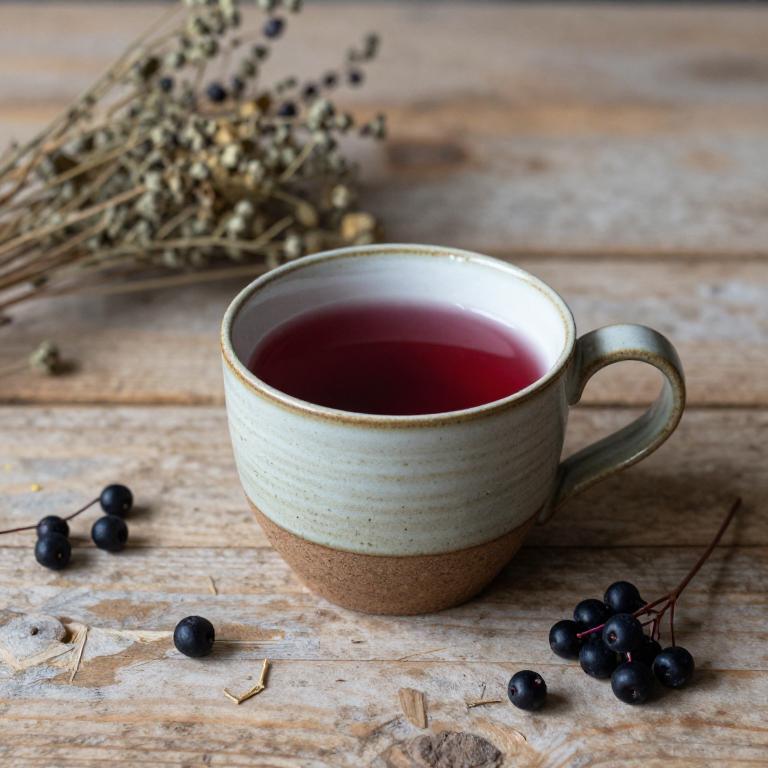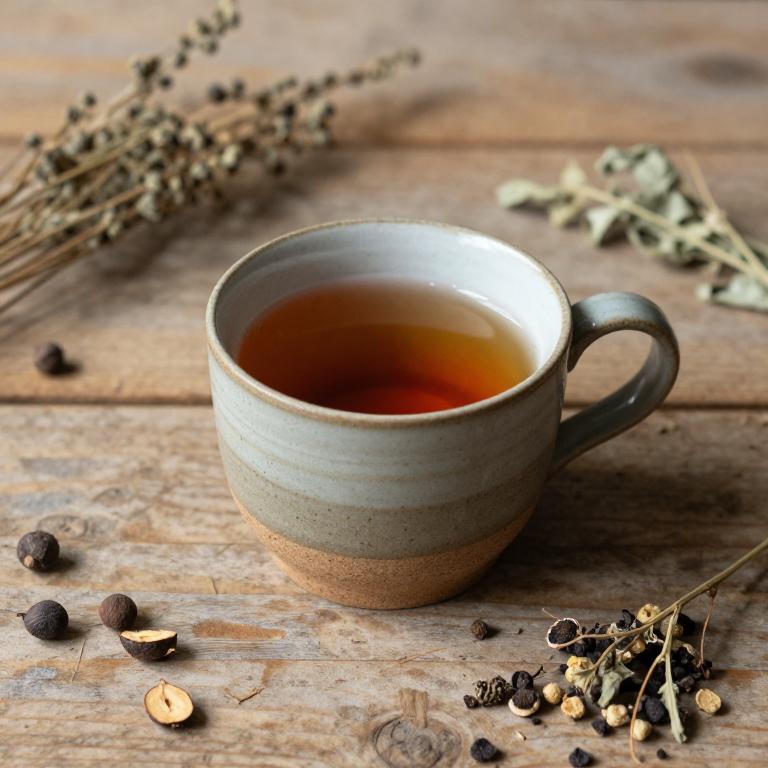10 Best Herbal Teas For Hoarse Voice

Herbal teas can be a natural and soothing remedy for a hoarse voice, often caused by inflammation or irritation of the vocal cords.
Chamomile tea is particularly effective due to its anti-inflammatory and calming properties, which can help reduce swelling and ease throat discomfort. Licorice root tea is another popular choice, as it contains compounds that may help protect the mucous membranes of the throat. Peppermint and ginger teas can also provide relief by promoting relaxation and reducing mucus buildup.
Drinking warm herbal teas several times a day can support vocal recovery and promote overall throat health.
Table of Contents
- 1. Chamomile (Matricaria chamomilla)
- 2. Salvia (Salvia officinalis)
- 3. Stinging nettle (Urtica dioica)
- 4. Ginger (Zingiber officinale)
- 5. Fennel (Foeniculum vulgare)
- 6. Echinacea (Echinacea purpurea)
- 7. Chaste tree (Vitex agnus-castus)
- 8. Black elderberry (Sambucus nigra)
- 9. Ceylon cinnamon (Cinnamomum zeylanicum)
- 10. Eucalyptus (Eucalyptus globulus)
1. Chamomile (Matricaria chamomilla)

Matricaria chamomilla, commonly known as chamomile, is a popular herbal tea often used for its calming and soothing properties.
Chamomile tea is believed to help alleviate a hoarse voice by reducing inflammation and soothing the throat due to its anti-inflammatory and antispasmodic effects. The tea contains compounds like apigenin, which may help relax the muscles and ease vocal strain. It is often recommended as a natural remedy for temporary voice issues caused by overuse, colds, or throat irritation.
While it is generally safe for most people, individuals with allergies to plants in the daisy family should use it with caution.
2. Salvia (Salvia officinalis)

Salvia officinalis, commonly known as sage, has been traditionally used in herbal teas to soothe a hoarse voice due to its anti-inflammatory and antimicrobial properties.
The herb contains compounds like thujone and rosmarinic acid, which may help reduce inflammation in the throat and fight off infections that contribute to hoarseness. When brewed into a tea, sage can provide a calming effect on the vocal cords, promoting easier and clearer speech. It is often recommended to drink sage tea warm, optionally with honey or lemon, to enhance its soothing properties.
While generally safe, individuals should consult a healthcare provider before using sage tea, especially if they have underlying health conditions or are taking medications.
3. Stinging nettle (Urtica dioica)

Urtica dioica, commonly known as stinging nettle, is a herbal remedy that has been traditionally used to support vocal health and alleviate hoarseness.
Its leaves contain a variety of bioactive compounds, including flavonoids, vitamins, and minerals, which may help reduce inflammation and soothe the throat. When brewed into a tea, stinging nettle can provide a calming effect on the vocal cords, making it a potential natural remedy for those experiencing a hoarse voice. However, it is important to note that while some anecdotal evidence supports its use, more scientific research is needed to confirm its efficacy for this specific condition.
As with any herbal remedy, it is advisable to consult with a healthcare professional before incorporating stinging nettle tea into your routine, especially if you have underlying health conditions or are taking other medications.
4. Ginger (Zingiber officinale)

Zingiber officinale, commonly known as ginger, is a popular herbal ingredient used in teas to soothe a hoarse voice.
The warming properties of ginger help reduce inflammation in the throat and ease irritation, making it beneficial for those experiencing vocal strain or coughing. Ginger tea can be prepared by steeping fresh or dried ginger root in hot water, and it often includes additional soothing ingredients like honey or lemon for enhanced comfort. Regular consumption of ginger tea may support overall respiratory health and promote quicker recovery from throat-related ailments.
Its natural anti-inflammatory and antimicrobial properties make it a valuable remedy for temporary voice hoarseness.
5. Fennel (Foeniculum vulgare)

Foeniculum vulgare, commonly known as fennel, is a popular herbal remedy used to soothe a hoarse voice due to its anti-inflammatory and expectorant properties.
The seeds of the fennel plant contain compounds like anethol and fenchone, which help reduce irritation in the throat and ease coughing. Fennel tea can be prepared by steeping the dried seeds in hot water, making it a simple and accessible remedy for those seeking natural relief. It is often recommended for individuals with throat infections, laryngitis, or voice strain, as it may promote healing and ease vocal discomfort.
However, it is advisable to consult a healthcare professional before using fennel tea, especially for prolonged use or in combination with other medications.
6. Echinacea (Echinacea purpurea)

Echinacea purpurea, commonly known as purple coneflower, is a popular herbal remedy often used to support the immune system and reduce the duration of colds and sore throats.
When brewed into a tea, echinacea may help soothe a hoarse voice by reducing inflammation in the throat and promoting healing of the mucous membranes. Its anti-inflammatory and antimicrobial properties can help alleviate symptoms associated with viral infections, such as laryngitis or pharyngitis. While it is generally considered safe for short-term use, it is important to consult a healthcare provider before using echinacea, especially for individuals with allergies or chronic health conditions.
Overall, echinacea purpurea herbal tea can be a natural and supportive option for those seeking relief from a hoarse voice.
7. Chaste tree (Vitex agnus-castus)

Vitex agnus-castus, commonly known as chasteberry, is often used in herbal teas to support hormonal balance and may help alleviate symptoms associated with hormonal fluctuations.
While it is not a direct treatment for hoarse voice, some traditional uses suggest it may help reduce inflammation and soothe the throat, potentially easing vocal strain. Herbal teas made from vitex are typically prepared by steeping the dried berries in hot water, and they are often combined with other herbs like licorice root or marshmallow root for added soothing properties. It is important to consult a healthcare provider before using vitex, especially for prolonged periods or in conjunction with other medications.
Overall, vitex agnus-castus herbal tea may be a complementary option for those seeking natural remedies for hoarseness, though its effectiveness can vary among individuals.
8. Black elderberry (Sambucus nigra)

Sambucus nigra, commonly known as elderberry, is often used in herbal teas to support the health of the throat and voice.
This plant contains antioxidants and anti-inflammatory compounds that may help reduce irritation and inflammation in the vocal cords, making it beneficial for individuals with a hoarse voice. Herbal teas made from elderberry are typically prepared by steeping dried berries in hot water, and they can be enjoyed either on their own or combined with other soothing herbs like licorice or chamomile. While sambucus nigra is generally considered safe when consumed in moderation, it is important to consult with a healthcare provider before using it, especially for those with underlying health conditions or taking medications.
Regular consumption of elderberry tea may help alleviate symptoms of a hoarse voice, though it should not replace professional medical advice or treatment.
9. Ceylon cinnamon (Cinnamomum zeylanicum)

Cinnamomum zeylanicum, commonly known as cinnamon, is often used in herbal teas to soothe a hoarse voice due to its anti-inflammatory and antimicrobial properties.
The warm, aromatic infusion helps to reduce irritation in the throat and may alleviate symptoms of soreness or dryness. Cinnamon tea can be prepared by adding a teaspoon of cinnamon powder or sticks to boiling water and letting it steep for several minutes. It is particularly beneficial for those experiencing hoarseness caused by colds, allergies, or excessive vocal strain.
However, it is advisable to consult a healthcare professional before using cinnamon tea, especially for prolonged periods or in combination with other medications.
10. Eucalyptus (Eucalyptus globulus)

Eucalyptus globulus, commonly known as eucalyptus or gum tree, is widely used in herbal teas to soothe a hoarse voice due to its anti-inflammatory and antimicrobial properties.
The tea is made by steeping dried leaves of the plant in hot water, allowing the essential oils and active compounds to release into the liquid. These compounds, such as cineole and flavonoids, help reduce throat irritation and inflammation, making it beneficial for those with sore or raspy throats. Regular consumption of eucalyptus globulus tea can also help clear mucus and ease breathing, supporting overall respiratory health.
However, it is advisable to consult a healthcare professional before using it, especially for prolonged periods or in combination with other medications.